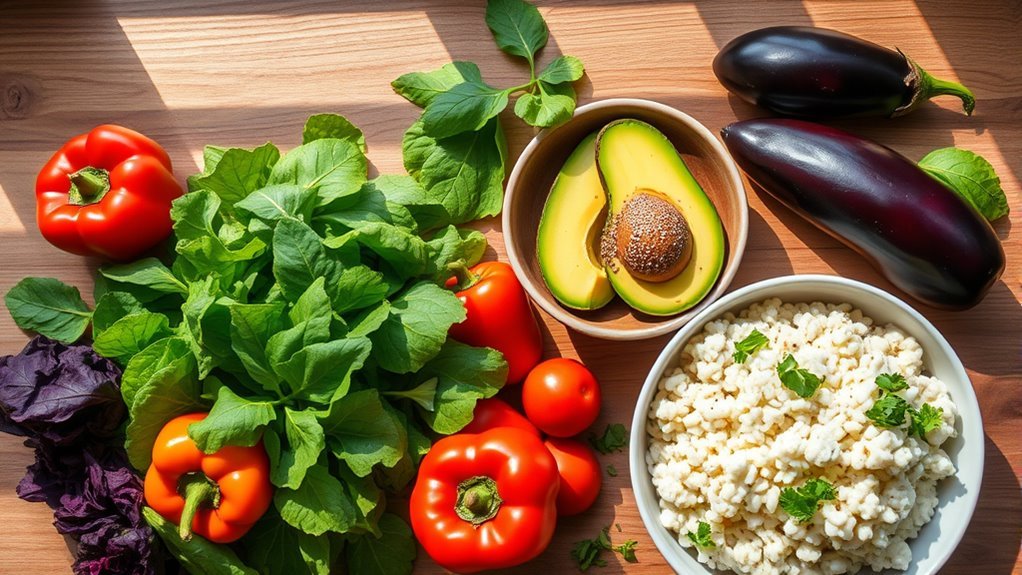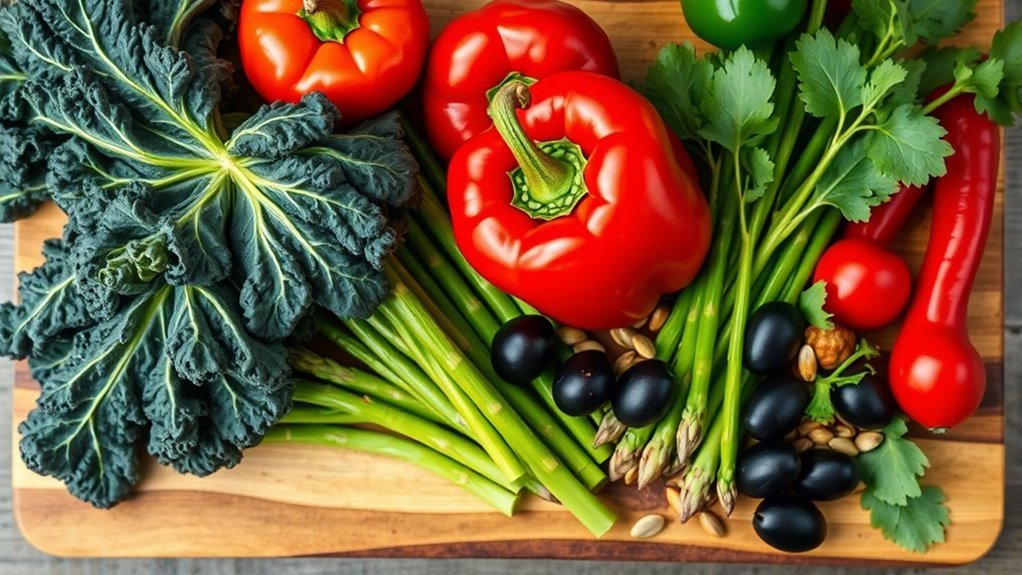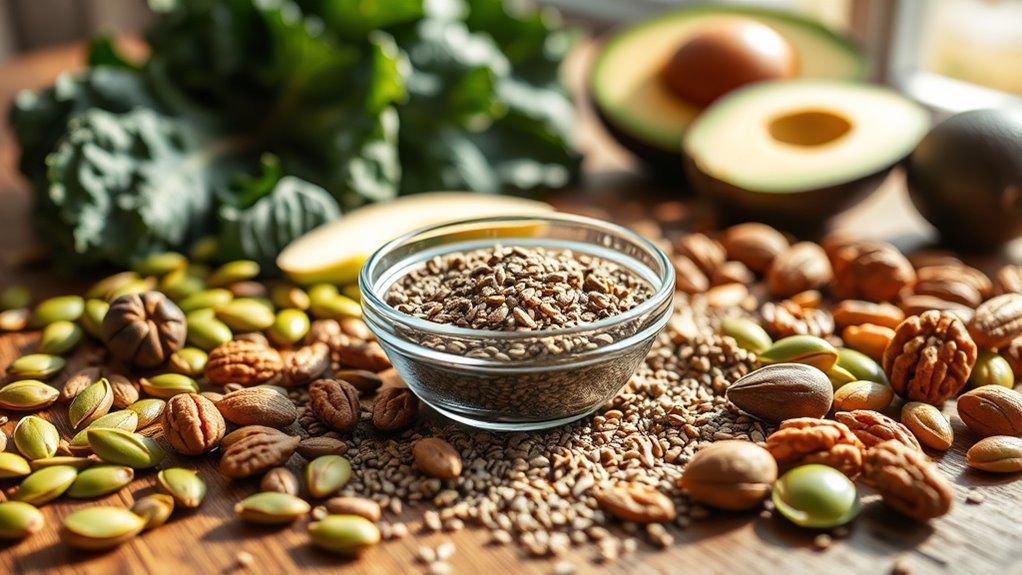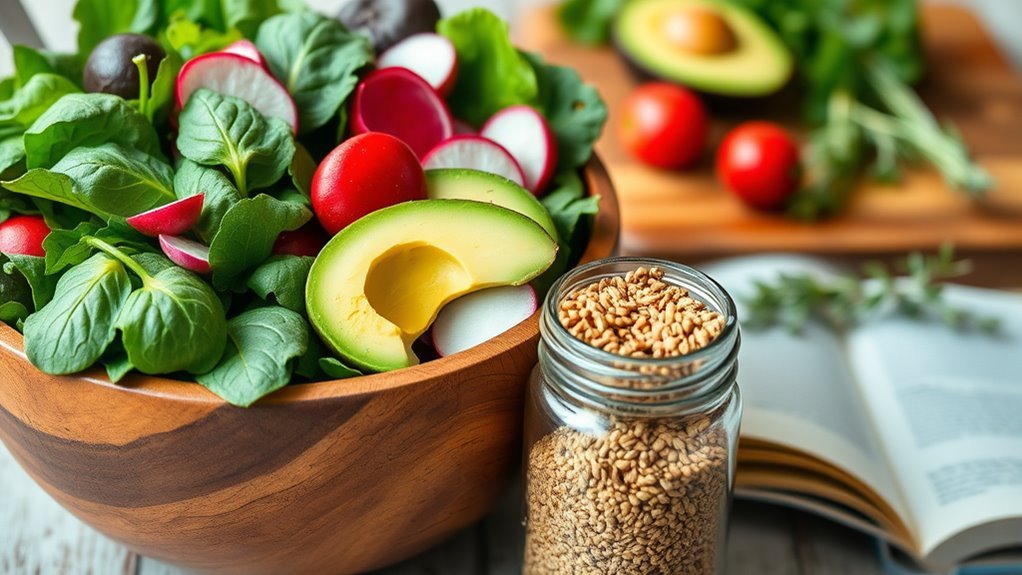To get enough fiber on a keto diet, focus on low-carb vegetables like spinach, broccoli, and cauliflower. Incorporate nuts and seeds such as almonds, chia, and flaxseeds for added fiber. Avocados are another excellent source, providing healthy fats along with dietary fiber. Don’t forget about low-carb berries like raspberries and blackberries. Tracking your intake can help you stay on course and guarantee you’re meeting your goals. Discover more fiber-rich options and tips to enhance your meals.
Understanding Fiber and Its Importance

While many people associate fiber primarily with digestive health, it plays an essential role in overall wellness, especially on a ketogenic diet. Fiber aids in maintaining healthy digestion, which can be particularly challenging when you’re limiting carbohydrates. It helps regulate bowel movements, preventing constipation and promoting gut health. You might be surprised to learn there are various fiber sources available that fit into your low-carb lifestyle. Chia seeds, flaxseeds, and certain nuts are excellent options that not only provide fiber but also healthy fats. Incorporating these foods can enhance your meal satisfaction and keep you feeling full longer. By understanding the importance of fiber, you’re taking a proactive step toward achieving your health goals while enjoying the freedom of a keto diet. Chia seeds are a versatile ingredient that can help you meet your fiber needs without exceeding carb limits.
Low-Carb Vegetables Rich in Fiber

Incorporating low-carb vegetables rich in fiber into your ketogenic diet can greatly enhance your nutritional intake without compromising your carb limits. Leafy greens like spinach and kale are excellent for adding volume and nutrients. Cruciferous vegetables, such as broccoli and cauliflower, provide fiber while keeping carbs low. Don’t overlook artichoke hearts, which are fiber-dense and versatile. Zucchini noodles make for a fantastic pasta substitute, and bell peppers add sweetness and crunch. Asparagus spears are not only nutrient-rich but also low in carbs. Diverse mushroom varieties can elevate your meals while contributing fiber. Finally, cucumber slices are invigorating and hydrating. By integrating these options, you’ll enjoy a satisfying and fiber-rich keto-friendly diet. Additionally, incorporating cruciferous vegetables can further diversify your meals while supporting overall health on a ketogenic diet.
Nuts and Seeds for Keto-Friendly Fiber

When you’re on a ketogenic diet, including nuts and seeds can greatly boost your fiber intake without pushing you over your carb limits. Various nut varieties, like almonds and walnuts, provide essential nutrients along with fiber, making them a great choice. Seeds, such as chia and flaxseeds, offer impressive health benefits too, including omega-3 fatty acids and antioxidants. Additionally, nuts like macadamia nuts are low in carbs, making them ideal for maintaining ketosis.
| Nut Variety | Fiber (g per 100g) | Benefits |
|---|---|---|
| Almonds | 12.5 | Heart health |
| Walnuts | 6.7 | Brain function |
| Chia Seeds | 34.4 | Digestive health |
| Flaxseeds | 27.3 | Hormonal balance |
Incorporating these into your diet can be both satisfying and nutritious!
Avocado: A Fiber Powerhouse
Avocados are another fantastic source of fiber that fits perfectly into a ketogenic lifestyle. Not only do they add creaminess to your meals, but they also come packed with numerous health benefits. With various avocado varieties available, you can enjoy different flavors and textures while boosting your fiber intake.
Avocados enhance your ketogenic meals with creaminess and fiber, offering diverse flavors and essential health benefits.
Here are a few avocado benefits you won’t want to miss:
- Promotes healthy digestion by keeping things moving.
- Supports heart health with healthy fats and fiber.
- Helps you feel fuller longer, reducing cravings.
Incorporating avocados into your diet allows you to enjoy flavorful dishes while ensuring you get enough fiber. Additionally, their low carb count makes them an ideal choice for those following a ketogenic diet. Embrace these nutrient-dense fruits, and enjoy the freedom to create delicious, satisfying meals on your keto journey!
Incorporating Psyllium Husk and Flaxseed
While you’re focusing on your ketogenic diet, adding psyllium husk and flaxseed can greatly boost your fiber intake without compromising your carb count. Psyllium husk is a soluble fiber that aids digestion and helps maintain bowel regularity, offering significant psyllium benefits for those on keto. You can easily incorporate it into smoothies or baked goods, enhancing texture while keeping carbs low. Flaxseed is another fantastic choice, rich in omega-3 fatty acids and fiber. You can whip up delicious flaxseed recipes like keto-friendly bread or pancakes, ensuring you stay satisfied. Additionally, flaxseed has approximately 1.5 grams of net carbs per tablespoon, making it an excellent choice for maintaining your keto diet. By adding these ingredients, you’ll not only meet your fiber needs but also enjoy tasty, nutritious meals that align with your keto lifestyle.
Exploring Low-Carb Berries
When you’re on a keto diet, incorporating low-carb berries can be a delicious way to boost your fiber intake. These berries not only provide essential nutrients but also offer various health benefits that can support your overall wellness. Let’s explore the best low-carb options, their nutritional advantages, and some creative recipes to enjoy them. Additionally, blackberries are particularly beneficial due to their low carbohydrate content, making them a great choice for maintaining a keto lifestyle.
Best Low-Carb Berries
Have you ever wondered which berries can fit into your low-carb diet while still providing essential nutrients? Fortunately, several berry varieties are perfect for your lifestyle, offering delicious flavors along with health benefits. Here are three low-carb options to enjoy:
- Raspberries: Packed with fiber and antioxidants, they’re great for digestion.
- Blackberries: These are low in carbs and rich in vitamins, making them a powerhouse snack.
- Strawberries: A favorite for many, they’re not only tasty but also provide key nutrients while keeping carbs in check. Additionally, strawberries have a low glycemic index(41) which minimizes blood sugar impact.
Including these berries in your diet allows you to indulge without sacrificing your health goals. Enjoy the freedom of savoring nature’s sweets while staying on track with your keto journey!
Nutritional Benefits Overview
Berries are not just a delicious treat; they’re also nutritional powerhouses that can enhance your low-carb diet. These low-carb fruits, like raspberries and blackberries, offer significant nutritional advantages. They’re rich in antioxidants, which help combat oxidative stress, and are packed with vitamins and minerals that support overall health. Most importantly, berries are excellent fiber sources. Fiber is essential for digestive health, and incorporating it into your keto regimen can help you feel fuller longer, stabilizing blood sugar levels. By choosing berries, you can enjoy a sweet flavor while reaping the benefits of their low-carb content. Additionally, pairing berries with leafy greens in your meals can further boost your fiber intake and overall nutrient density. So go ahead, indulge in these nutrient-dense fruits to elevate your keto lifestyle without compromising your goals.
Creative Berry Recipe Ideas
While incorporating low-carb berries into your diet is beneficial, exploring creative ways to use them can elevate your culinary experience. Here are some delicious ideas to inspire you:
- Whip up a rejuvenating berry smoothie with spinach, almond milk, and a scoop of protein powder for a nutritious breakfast.
- Create a vibrant berry salad by combining mixed greens, walnuts, feta cheese, and a drizzle of balsamic vinaigrette for a satisfying lunch.
- Freeze berries to use as ice cubes in your drinks, adding a burst of flavor without the carbs.
These creative recipes not only enhance your meals but also pack in fiber and antioxidants, helping you stay on track with your keto journey while enjoying every bite! Incorporating low-carb fruits into your meals can further support your nutritional goals.
Tips for Tracking Your Fiber Intake
To effectively track your fiber intake on a keto diet, it’s crucial to incorporate a few practical strategies. Start by using fiber apps, which can simplify your fiber tracking. These apps allow you to log your meals and instantly see fiber content, making it easier to stay within your desired range. Keep a daily food journal, noting your fiber sources like low-carb veggies and nuts, so you can visually assess your intake. Remember to set specific fiber goals tailored to your individual needs, adjusting as you progress. Additionally, incorporating low-carb vegetables can significantly enhance your fiber intake while supporting ketosis. Finally, regularly review your fiber consumption to identify patterns or areas for improvement. With these tips, you’ll empower yourself to enjoy the freedom of a balanced keto lifestyle while meeting your fiber needs.
Frequently Asked Questions
Can I Get Enough Fiber Without Vegetables?
Yes, you can get enough fiber without relying on vegetables. You can explore nutrient alternatives like chia seeds, flaxseeds, and psyllium husk, which are excellent fiber sources. Nuts and seeds also provide fiber while fitting into your dietary preferences. Incorporating these options into your meals or snacks can help you maintain your fiber intake. Remember, balancing your diet with a variety of sources can keep things interesting and enjoyable!
How Much Fiber Should I Aim for Daily?
You should aim for about 25 grams of fiber daily. Imagine savoring a delicious meal while knowing you’re nourishing your body. Fiber-rich foods like chia seeds, nuts, and avocados can help you reach that target. Incorporating these into your meals not only supports digestion but also keeps you feeling satisfied. With a bit of creativity, you can enjoy your freedom on a keto diet while still hitting your daily fiber intake goals.
Are There Fiber Supplements for Keto?
Yes, there are fiber supplements that fit into a keto-friendly lifestyle. Look for options like psyllium husk, inulin, or acacia fiber, which are low in carbs and high in soluble fiber. These can help you meet your daily fiber needs without disrupting ketosis. Additionally, consider incorporating fiber sources like chia seeds and flaxseeds into your meals for added benefits. Always check labels to verify they align with your dietary goals!
What Are the Symptoms of Fiber Deficiency?
If you’re lacking fiber, you might experience bloating, constipation, or even fatigue. Your digestive health can suffer, leading to discomfort and irregularity. Without sufficient fiber sources, your body struggles to function efficiently. You may also notice increased cravings for unhealthy foods, impacting your overall well-being. To reclaim your freedom and feel your best, focus on incorporating a variety of fiber-rich foods, ensuring your digestive system stays happy and healthy.
Can Fiber Impact Ketosis?
Yes, fiber can impact ketosis. While it’s essential for digestive health, certain fiber sources can affect your carb intake. Focus on keto-friendly options like chia seeds, flaxseeds, and leafy greens, which provide fiber without pushing you out of ketosis. Incorporating these sources helps maintain your fiber levels while keeping carbs low. Balancing fiber intake is key to enjoying your keto journey without sacrificing your health or digestive comfort.
References
- https://www.ncbi.nlm.nih.gov/pmc/articles/PMC5466930/
- https://www.health.harvard.edu/staying-healthy/the-benefits-of-fiber
- https://www.eatright.org/health/wellness/preventing-illness/the-importance-of-fiber
- https://www.cdc.gov/nutrition/data-statistics/know-your-fiber.html
- https://www.webmd.com/diet/features/the-truth-about-fiber
- https://www.mayoclinic.org/healthy-lifestyle/nutrition-and-healthy-eating/in-depth/fiber/art-20043923
- https://www.hsph.harvard.edu/nutritionsource/carbohydrates/fiber/


